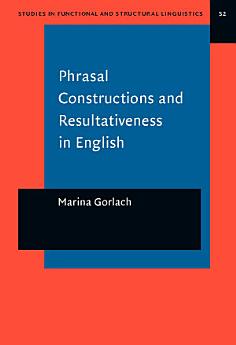Phrasal Constructions and Resultativeness in English: A sign-oriented analysis
Marina Gorlach
Dis 2004 · Studies in Functional and Structural Linguistics Ibhuku elingu-52 · John Benjamins Publishing
I-Ebook
151
Amakhasi
reportIzilinganiso nezibuyekezo aziqinisekisiwe Funda Kabanzi
Mayelana nale ebook
Eat up the apple or Eat the apple up? Is there any difference in the messages each of these alternative forms sends? If there isnt, why bother to keep both? On the other hand, is there any semantic similarity between eat the apple up and break the glass to pieces? This study takes a fresh look at a still controversial issue of phrasal verbs and their alternate word order applying sign-oriented theory and methodology. Unlike other analyses, it asserts that there is a semantic distinction between the two word order variants phrasal verbs may appear in. In order to test this distinction, the author analyzes a large corpus of data and also uses translation into a language having a clear morphological distinction between resultative/non-resultative forms (Russian). As follows from the analysis, English has morphological and syntactic tools to express resultative meaning, which allows suggesting a new lexico-grammatical category resultativeness.
Nikeza le ebook isilinganiso
Sitshele ukuthi ucabangani.
Ulwazi lokufunda
Amasmathifoni namathebulethi
Faka uhlelo lokusebenza lwe-Google Play Amabhuku lwe-Android ne-iPad/iPhone. Livunyelaniswa ngokuzenzakalela ne-akhawunti yakho liphinde likuvumele ukuthi ufunde uxhunywe ku-inthanethi noma ungaxhunyiwe noma ngabe ukuphi.
Amakhompyutha aphathekayo namakhompyutha
Ungalalela ama-audiobook athengwe ku-Google Play usebenzisa isiphequluli sewebhu sekhompuyutha yakho.
Ama-eReaders namanye amadivayisi
Ukuze ufunde kumadivayisi e-e-ink afana ne-Kobo eReaders, uzodinga ukudawuniloda ifayela futhi ulidlulisele kudivayisi yakho. Landela imiyalelo Yesikhungo Sosizo eningiliziwe ukuze udlulise amafayela kuma-eReader asekelwayo.







